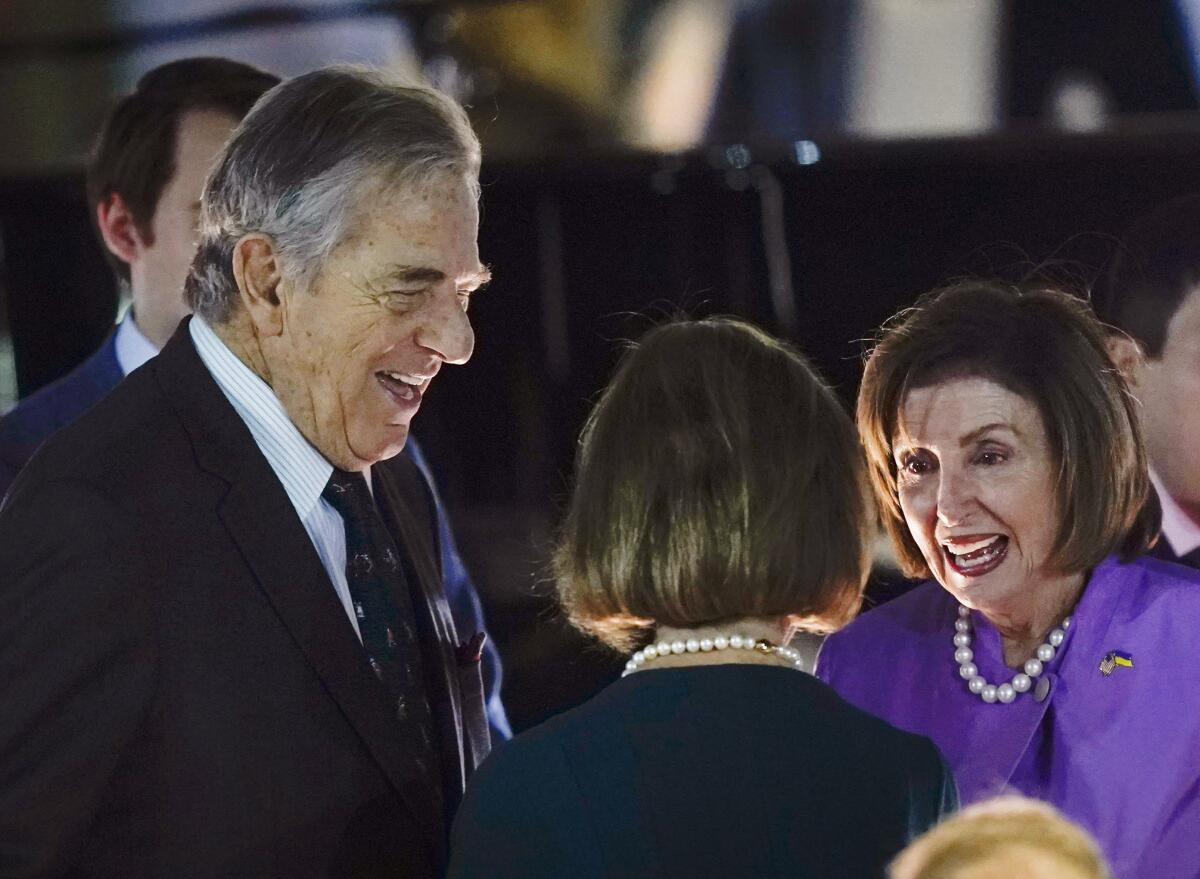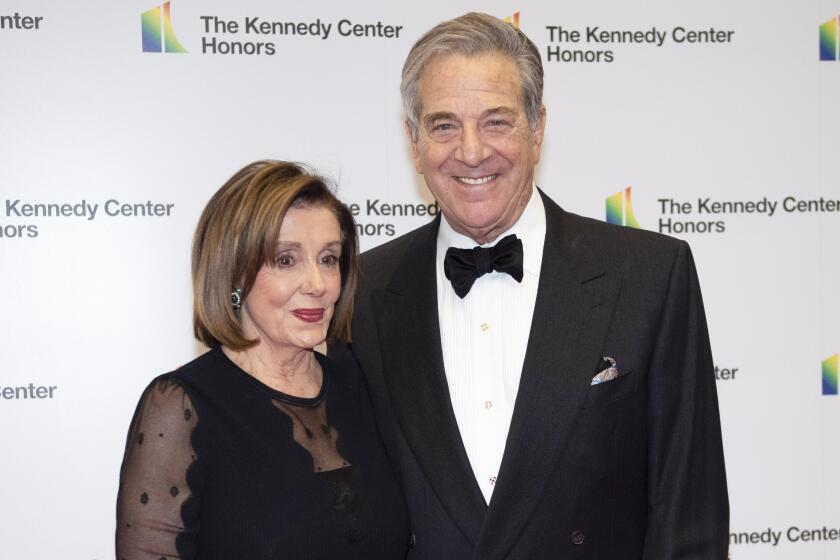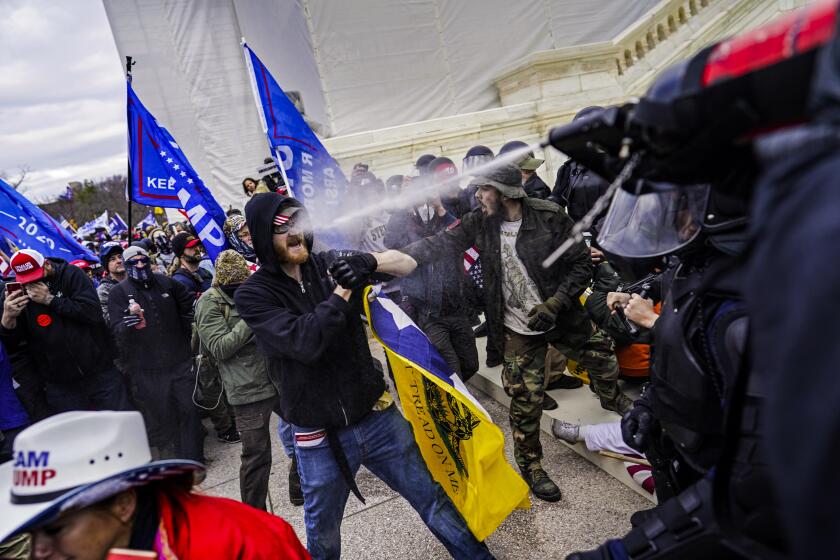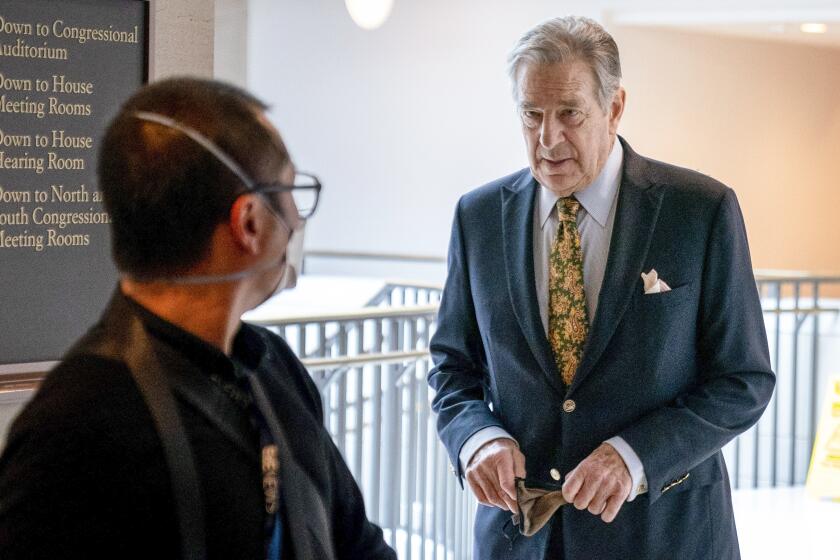Column: Paul Pelosi is a victim of poisoned politics. Those inciting violence must be held to account

Elections have consequences, as the saying goes. So too does the rhetoric surrounding elections.
To say our politics have coarsened over the last few decades is like noting that temperatures drop and daylight shortens as we settle into autumn.
It’s so obvious, it seems the natural order of things.
But it’s a choice we’ve made and grown to accept, and even embrace. The most strident among us are lavished with attention — book contracts, TV ratings, millions of followers on social media. Those who provoke and outrage win office and legions of devotees.
As our politics have grown less ideological — a belief in bigger vs. smaller government, support for higher or lower taxes — and more theological, the difference between Democrat and Republican has increasingly been cast in terms of good vs. evil.
Taken to its illogical extreme, the result is violence, like the attack early Friday on Paul Pelosi by an assailant who invaded his San Francisco home in apparent hopes of assassinating his wife, Democratic House Speaker Nancy Pelosi.
Suspect David DePape has been booked on suspicion of attempted murder and other counts. The assault on Paul Pelosi raises concerns as attacks on public officials rise.
She was in Washington, with her protective detail, at the time of the break-in. Paul Pelosi, 82, who was bludgeoned with a hammer, was hospitalized and underwent surgery Friday for a skull fracture and injuries to his right arm and hands. Doctors expect a full recovery.
Political violence is, of course, nothing new.
This country was founded in a revolution, fought a Civil War to end the bondage of its Black citizens and has witnessed countless individuals killed for espousing contrary or unpopular beliefs.
Those events are part of history. What assaults us today are seemingly endless accounts, one after another, of lawlessness and political vigilantism.
Death threats. A plot to kidnap Michigan’s governor. Self-appointed watchdogs swarming polls and menacing voters. Insurrectionists sentenced for invading the Capitol at the behest of a power-mad president.
Much of the blame rests on Republican shoulders, as many of the faithful have embraced outlandish and frankly nutty QAnon theories that paint Democrats as a party of devil-worshiping pedophiles.
While the motive of the attack on Paul Pelosi has yet to be determined, the suspect’s social media profile is filled with right-wing disinformation that experts have warned can lead to violence
But the animosity — if not outrageous caricature — runs both ways. Repeated polls have found Democrats questioning the goodwill and patriotism, not to mention judgment, of Republicans.
It’s no longer just the fringe acting out.
“What’s new is we have violent sentiments in the mainstream of America,” said Robert Pape, a University of Chicago expert on political extremism.
A September survey he helped conduct found 5% of American adults believed the use of force was justified in restoring Donald Trump to the presidency. That may seem like a small number, but it represents 13 million people.
As Pape noted, “Thirteen million is way too big a number to think of as the fringe.”
Politics, which is too often disparaged, is how we settle our differences without taking up arms. Or, at least, it’s supposed to be. When the disagreement between parties, party loyalists and the other side grow shrouded in fear and conspiracy theories, it should not be surprising when someone unhinged lashes out.
“I want to be clear,” Rep. Adam Kinzinger tweeted after news of the attack on Pelosi. “When you convince people that politicians are rigging elections, drink babies blood, etc., you will get violence.”
Tellingly, the Illinois Republican was speaking from the political wilderness; Kinzinger was effectively excommunicated from his party for voting to impeach Trump after the Jan. 6 riot and agreeing to serve on the House committee investigating the attempted coup.
Paul Pelosi, the husband of U.S. Speaker of the House Nancy Pelosi and a longtime businessman, was attacked Friday morning at his home in San Francisco.
Hours before the assault on Paul Pelosi, billionaire Elon Musk assumed ownership of Twitter. It was a coincidence of timing and geography. (Twitter headquarters is less than three miles from the Pelosi residence.) But it doesn’t bode well.
The social media site has been a slough of hate speech, disinformation and ad hominem attack, contributing in a major way to the polluting of our politics. Musk has promised to unleash even more vitriol and hostility by raising the gates and lifting the barriers to Twitter’s already foul content.
Words matter. Provocation has consequences.
Pelosi’s alleged assailant, David DePape, 42, was apparently well-marinated in a stew of crazy right-wing theories about “the elites/ruling class.”
The incitement to violence will stop only when those vested with authority, be it elected office, social media platform or national TV audience, are made to pay a price. The criminal and dangerous will land in court. Those who inspire them must also be held to account.
More to Read
Get the latest from Mark Z. Barabak
Focusing on politics out West, from the Golden Gate to the U.S. Capitol.
You may occasionally receive promotional content from the Los Angeles Times.














